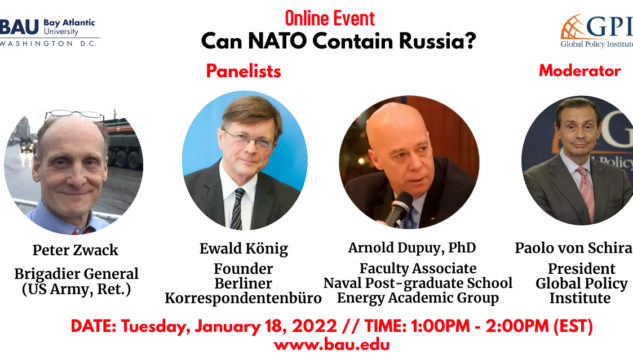Events

WEBINAR // Can NATO Contain Russia?
Russia now openly claims to have veto power when it comes to security policy choices made by neighboring countries. Moscow stated that Ukraine and other bordering countries should not be able to join NATO, as such developments would threaten Russian security. Likewise, Moscow argues that some NATO troops and hardware deployments and military exercises should stop since they are direct threats to Russia’s security. In order to impress upon the NATO Alliance that Russia wants to force its will on the rest of Europe, President Putin is openly threatening to invade Ukraine, unless all his demands are met in full. Is this a bluff? Or is Putin serious about starting a war in Ukraine, after having annexed Crimea in 2014 and fueling a conflict in the Donbas Region in Eastern Ukraine? In either case, how should the US-led NATO Alliance respond? As NATO-Russia negotiations are underway in Europe, Washington is officially committed to finding a peaceful solution to this crisis via diplomacy. A suggested course of action is a package of mutual concessions aimed at de-escalating tensions. Will Moscow agree? Or will Putin invade Ukraine claiming that he is forced to do this because of NATO’s intransigence?
Arnold C. Dupuy, PhD, Faculty Associate, Naval Post-graduate School, Energy Academic Group
Education: PhD, Virginia Tech
Ewald König, Founder of Berliner Korrespondentenbüro
Ewald König (bornin Vienna, Austria) is a European correspondent and analyst based in Berlin, Germany. He is the owner of the Berliner Korrespondentenbüro -- International Media Projects, book author, moderator, TV host and commentator on foreign TV channels.
He has been a journalist for 45 years. He was the only correspondent who was accredited in both West and in East Germany and became eyewitness of the fall of the Berlin Wall. He wrote several books about this time. For five years he was chairman of the Federal Association of the Foreign Press (VAP) in Germany (500 correspondents reporting to media in 60 countries).
He was correspondent for an Austrian daily, then editor--in--chief and publisher of a pan-European online medium. Since then, he has been editor--in--chief of the Berliner Korrespondentenbüro – International Media Projects, TV moderator, commentator in foreign (mainly Arabic) TV broadcasters and organizer of the so-called correspondents’ cafe (www.korrespondenten.cafe) with German and foreign politicians.
Peter Zwack, Brigadier General (US Army, Ret.)
From 2012 – 2014, BG Zwack served as the United States Senior Defense Official and Attache to the Russian Federation. By interacting with Russians at multiple levels since 1989, including defense, security, academia, policy, veterans, and private citizens, BG Zwack developed a unique hands-on perspective on Russia and Eurasian security affairs during a turbulent period that included the recent strife in Crimea and Eastern Ukraine.
Brigadier General Peter B. Zwack enlisted in the US Army in 1980. He subsequently served 34 years as a Military Intelligence and Eurasian Foreign Area Officer serving in diverse and challenging duty locations including West Germany, South Korea, Kosovo, Afghanistan, and Russia.
Zwack was a Senior Russia-Eurasia Research Fellow at National Defense University (Institute for National Strategic Studies) at the National Defense University.
Paolo von Schirach, GPI President, and Chair Political Science and International Relations, Bay Atlantic University